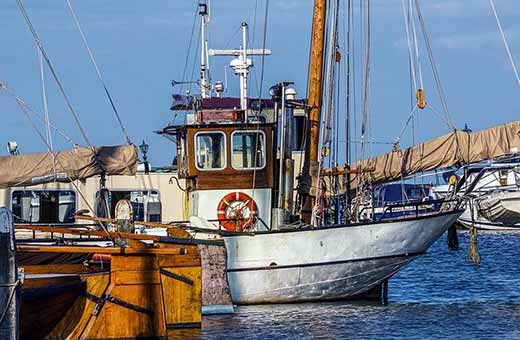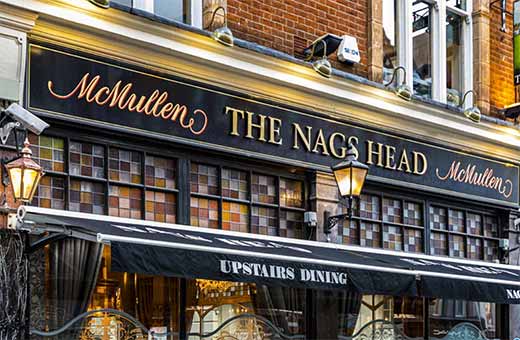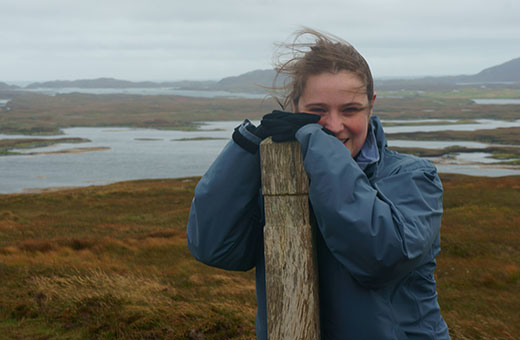 Fishing flows in Martin’s blood. His earliest memories are waiting for his dad and grandad to return from the sea. After the storm of ’72, his grandad never came back, but Martin made his first deep sea fishing trip when he was fourteen, anyway. The rock and drag of the trawler feels more natural than walking. He stands braced on deck, his hand caressing the railing. The metal bubbles, but the rust hasn’t broken through the bright white paint yet. The power of the engine pulses through his body as the trawler cuts through the swollen waves out of the harbour.
Fishing flows in Martin’s blood. His earliest memories are waiting for his dad and grandad to return from the sea. After the storm of ’72, his grandad never came back, but Martin made his first deep sea fishing trip when he was fourteen, anyway. The rock and drag of the trawler feels more natural than walking. He stands braced on deck, his hand caressing the railing. The metal bubbles, but the rust hasn’t broken through the bright white paint yet. The power of the engine pulses through his body as the trawler cuts through the swollen waves out of the harbour.
“Where’re we going first, Martin?” Davey, the skipper, asks.
In the wheelhouse, computer screens glint, and a keyboard sits pride of place by the window. Martin scans the radar maps. If the boat were his, he wouldn’t ask for directions. But he worked for Davey’s dad and grandad, and now he’s The East Row’s talisman.
“Devil’s Bank.” Martin makes his voice low to project confidence.
“We fished there two years ago?” Davey scowls with the effort of remembering. “A good haul of cod, bit of monk and hake.”
Martin purses his lips in agreement. “The water’s warmer there, early spring, brings up the premium fish.”
“But we didn’t fish there last year?” Davey’s questions are more frequent; Martin senses his time as adviser passing.
“Winds were wrong last year,” Martin says.
Davey nods, like he understands the problem. Martin surveys the vanishing harbour and smirks. Johnny McNeill fished the Devil’s Bank two days before they sailed last year. There’d have been no fish, gale or light breeze.
Davey sets course. Responsibility sinks in Martin’s stomach like wet concrete – it will be his fault if the nets come up empty. The East Row’s a new boat; cost two million easy. Davey’s bank loan makes his eyes water. He sits back and throws out his legs, takes more space than he needs. As long as he keeps the boat full of fish, no one cares he can’t lug boxes like the lads. And with Cheska’s wedding paid for, he won’t need the deep sea runs much longer.
Twenty miles out, the trawler skirts the rocks north of Eilean Dearg and the island foreshore swings into view. Ruined houses sit like broken teeth, sunlight flashing in shattered windows.
He’d been surprised Cheska asked him to give her away. She left with her mum when she was three. He’d given her away a long time ago. He didn’t mind paying for the wedding though. It was Cheska’s idea to keep it small. Her mother wanted something bigger, but Meg always wanted more. Martin paid as much as he could, and Cheska was thrilled.
A glimmer of red catches Martin’s attention on the hillside above the ruined houses; solid, post box red. They evacuated the island in the summer of ’64, after the government ruled it too remote for human occupation. Martin looks away and glances back. It’s too early in the year for poppies, too far from the shore to be machair.
“Food’s ready,” Euan, the young deckhand, shouts.
Martin waves his thanks, but twists to keep the hillside in view. The flash of red rises, then falls like a flag blowing in the breeze.
“Egg and chips,” Euan yells.
Martin climbs down to the galley. The deck hands saved him a lower bunk, and he pulls a jumper from his pack. Even if something red survived on the island, it would be sun bleached and weather worn by now. Maybe a bird dropped a plastic bag, and it stuck fast on a rock.
The crew eats together in the galley, Davey too. A last meal before they learn if Martin’s suggestion yields fish. Their elbows knock as they dip chips and bread and butter into egg yolk.
Cheska’s wedding dress had been too puffy for his liking, more a tutu than an elegant gown. He’d told her she looked beautiful. She smiled so much that day it was true.
“I forgot to tell you,” Euan says, in a way that means he’s forgotten nothing. “I’m going to be a dad in November.” A grin grows across his face. He wipes his finger around his plate, collecting ketchup. “Moving out of home, getting a dog and a baby.”
The crew cheers. Davey slaps Euan on the back. Martin squashes bread and butter between his fingers, suppressing the urge to tell the lad not to ruin his life. Euan’s only eighteen. But he can’t take the smile from Euan’s face any more than he could have told Cheska what he thought of her wedding dress.
He rests his knife and fork on the dinner plate. He’d felt joy in life’s possibilities once, too. Not when he’d learned Meg was expecting Cheska. Two years later when Yvonne, the landlady of The Nag’s Head, told him she was pregnant with his baby.
It was dark when they wound in the nets at Devil’s Bank. Martin knows from the screech of the winding gear there’s weight in the haul. Gannets swoop into the floodlight, diving for falling debris.
“Martin’s done it again,” Davey yells.
After they released the writhing bundle of fish into the sorting shoot, the crew approach for handshakes and high-fives. Martin grins like his lips are falling off. He wasn’t a bad man. Meg had wanted to marry quickly because her dad was ready with his fists. He’d hated telling her about Yvonne; she couldn’t go home.
“Why d’you do it?” Meg asked.
Euan sneaks behind him and grabs his shoulders, shaking his bones. There’s more money for the lads if the boat’s full, and the kid needs everything he can get now.
He’d known after Cheska was born he’d made a mistake. Yvonne hadn’t been a younger model, she was fifteen years his senior. She’d run The Nag for five years, turning it into a thriving business. He liked that she didn’t need him, or want anything from him. He’d even thought she was too old to fall pregnant.
The crew climbs into the hull and squeeze between the processing units. The fish slip along the metal shoots towards them, alive and writhing. Martin slices open the belly of a fat hake and pulls out tumbling innards. They slither through his gloved fingers into the waste shoot.
Martin would never forget the way Cheska gripped his arm before they walked down the aisle. Yvonne had gripped his arm the same way when they’d talked about their future. Their baby was her last chance to be a mother. She wanted to do it right. Martin makes two clean knife strokes under the gills of a monk fish and pulls out the throat.
Euan says he needs a leak and climbs on deck. The other lads smirk, knowing he’ll heave over the side. The stink of the first fish haul’s the worst.
Martin loved Yvonne, but not like they said in the movies. He’d thought he could save Meg from her father’s fists and they’d be happy, but once the drama was over, they’d nothing in common. He and Yvonne talked about everything.
It’s three hours before they stack the last box. The lads steal a few hours sleep before the next haul, but Martin stays in the bank. He’d need to pee as soon as his head hit the pillow, anyway. His hands ache from the ice, but he makes sure each box contains the same sized fish. The customer needs to know what they’re getting, straight and true. If he’d had a son, he’d have bought a boat and started a family business; something meaningful for a son to inherit. He straightens the shiny dead bodies, head to tail, row after row. Take care now, and the box will fetch a higher price at market.
He’d bought Yvonne a red wool swing coat before he’d know she was pregnant. Cost him money he should have spent on Cheska, but once he knew Yvonne was pregnant, it felt good to give her something to keep her warm.
Four days of perfect weather, blue sky and cumulus clouds. The temperature falls at night, cutting in the darkest hours as they reel in the nets. After their success at Devil’s Bank, Davey follows all Martin’s directions and the nets bulge, every haul. After five days the bank is full, thirteen hundred boxes of cod, hake and monk fish. The East Row returns to harbour early.
“You’re no Jonah,” Davey says, bowing like Martin is a divine presence.
Martin stands back against the deck rail. Davey’s face is flush with the adrenaline of a full boat and the promise of money, and Martin wants to take in as much of his gratitude as possible. Davey’s saved thousands in unused fuel.
Somewhere on the soft breeze Martin hears his dead father. Never keep your back to the rail. Martin knows better than anyone, even in calm weather, a rogue wave can wash you away. He turns. A pod of dolphins arches over the sea, the water shattering and reforming over their diving forms.
He searches for Eilean Dearg on the horizon, thinks he can see a flash of red, blinks and rubs his eyes. Martin’s heart races as the boat passes the closest point to the island. Shards of sunlight dance on broken windows. A little further and he’s free. And then he sees colour behind the ruined houses, something blowing in the breeze. Martin takes another glance and the red shadow rises on the hillside.
“Is there anyone farming on Eilean Dearg?” he asks Davey as the island recedes from view.
Davey looks up from the computer. He’s recording the size of the catch, documenting the number of each species so the government knows they haven’t exceeded their quota.
“I don’t think anyone goes there anymore,” he says. “Why?”
Martin shrugs. “Just wondered.” He’s scared to point out the red spot on the hillside.
“Last I heard they sold it to a London banker.” Davey snorts. “Doubt he’s set foot on the place.”
 That night Martin walks into The Nag’s Head, solid ground jarring his legs. The banker had been the butt of every joke in the taproom.
That night Martin walks into The Nag’s Head, solid ground jarring his legs. The banker had been the butt of every joke in the taproom.
“Is anyone farming out on Eilean Dearg?” Men hunched on barstools grunt their replies. No one farms so far out, they say, even though a banker owns the land.
Yvonne told him about the evacuation. She had been four and remembered being cold and her mother sobbing as they boarded a fishing boat for the mainland. They’d left their furniture, pots and pans, and a life they’d never replace. She’d described the flowers and leaping fish her dad had carved into her bedhead to stop her nightmares.
Martin drains his beer glass and eyes the single malt on the top shelf behind the bar. “Could you drop me on Eilean Dearg?” he asks Tommy Fields, owner of a small lobster boat.
“What are you?” Tommy asks. “A tourist? It’s been years since a boat’s been near that harbour.”
Martin shrugs. “Will you take me?”
Three days later, Martin sets out in early morning darkness, heading for Tommy’s boat in the local harbour. He watches the sunrise from the deck. First light is brighter than ordinary daylight, pressing on his eyes, causing pain.
“I’m not going too close,” Tommy says. “There’s a dingy, you can row yourself ashore.”
Martin hasn’t rowed in years, he’s not sure if his arms are strong enough. But he nods as if everything will be fine. Yvonne had wanted to take their child to the island. Wanted to walk through her old life, play on her childhood beach. Run her fingers along the etchings on her childhood bed. She talked of Eilean Dearg like it was a living, breathing place.
“I’ll wait for you on the way back, 2 pm,” Tommy says. “Don’t be late.”
Martin propels the dingy towards the beach, aiming for shallow water. The currents push him back and his arms burn, but he rides the waves and when he’s close enough, he jumps out and pulls the boat ashore.
He collapses on the beach, buries his hands in the soft tumbled pebbles and catches his breath. The contours of the island shield him from the bite of the wind.
The houses appear smaller now he’s on the island. He knows which was hers: the cottage partially hidden behind the outcrop of rock at the end of the beach. She’d described the place so often, the blue curtains, the fragrance of a peat fire, but that had been twenty years ago, after thirty years away from the island.
The roof of Yvonne’s house had collapsed. Everything she’d left behind buried beneath rotting timbers. Damp wood crumbles in his hand as he clears the doorway. Inside, he climbs over two large beams to the Modern Mistress stove Yvonne’s mother had installed two years before anyone talked of evacuation. She’d been the envy of the island.
A rocky outcrop sheltered the back of the house. Sections of roof beam remained intact, and underneath a small child’s bed, with flowers and fish scratched into the headboard by a dedicated, but unskilled hand.
Martin scrambles out of the house, back to the beach. The wind is stronger, blowing from the sea. He searches for the path from the hamlet up the hillside. Worn stones sunk into long grass. He scours the ground for any clue of someone being there before him. He doesn’t look up for the bright red colour he knows rests on the hillside. Instead he climbs, his feet lodging against clumps of peat and roots of flowers. Ground-nesting birds screech their warnings, flying from the grass around him.
He couldn’t leave Cheska’s mum. He’d promised her a family, and she was his responsibility. Cheska was a baby and her mother not much more. They couldn’t support themselves. Yvonne would provide for her baby. She didn’t need him.
True love is only possible if two people contrive to make it exist. And somehow other things mattered more to Martin than love. He’d offered Yvonne money for an abortion. Said he’d help her pay for the kid if she wanted. She’d pulled on the buttons of her coat.
His foot twists on a clod of peat and burns his ankle. He kneels and massages his skin.
Cheska’s mum left three years later, anyway. Even if he was prepared to live a lie, she wasn’t.
He sits in front of a displaced ice age boulder, rests his back on the cold stone.
Yvonne waited for the ferry carrying delivery trucks from the Islands. And she walked in front of a lorry, too late for the driver to stop. Martin rushed to the ferry road as soon as he heard. The police had moved her body to the verge, twisted in her red swing coat.
Martin rests his hand on the bright red cloth, and waits for the day to grow old.
***
Gillian Walker is a fiction writer based in the UK. Her flash novella The World at the End of the Garden is published by Flash: The International Short-Short Story Press. Her work can be found in Popshot Quarterly, Ambit, Into the Void and Jellyfish Review. She was a finalist in the Black River Chapbook Competition Spring 2018.
Your support lets us know our work is appreciated. We’re a paying market, publishing brilliant new work of fiction and non-fiction that comes our way. As a small group of volunteers, we’re dedicated to writers, readers, and publishers and want to keep our site ad, pop-up, and fire-wall free. Please do consider supporting us in whatever way you can. Thank you.


